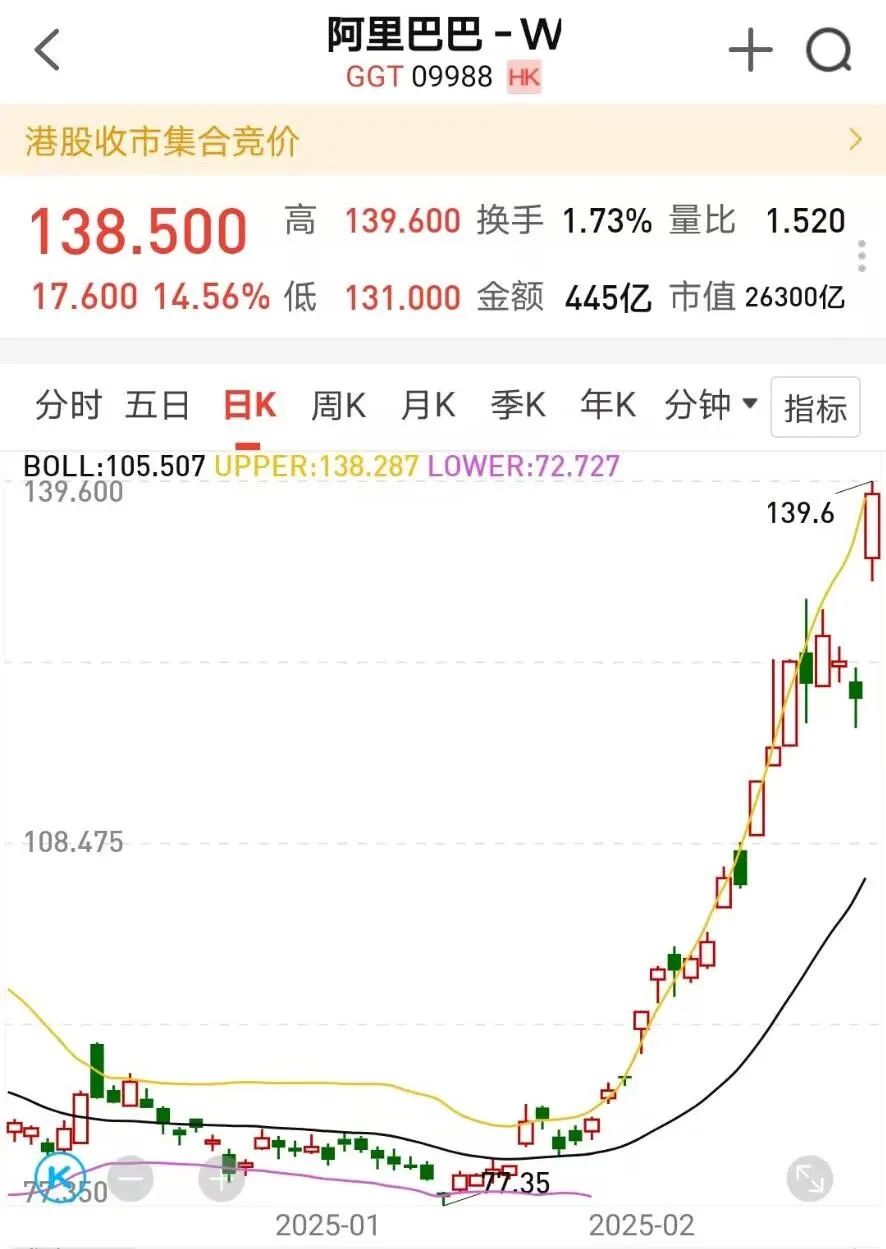Transformative Expectations: The Rise of AI-Powered Alibaba
![]() 02/24 2025
02/24 2025
![]() 562
562
Alibaba is back in the limelight, with its impressive financial report merely serving as a prelude to greater things.
On February 21, Alibaba's share price soared, closing up 8.09% on U.S. markets amidst a trading volume of US$16.295 billion, ranking third for the day. In Hong Kong, its stocks surged over 14%, pushing its market value beyond RMB 2.6 trillion, marking a pivotal AI-driven turning point.

On February 20, Alibaba unveiled its fiscal year 2025 third-quarter financial report, revealing revenues of RMB 280.15 billion, up 8% year-on-year; operating profit stood at RMB 41.205 billion, a leap of 83% year-on-year; and net profit attributable to ordinary shareholders hit RMB 48.945 billion, a 333% increase year-on-year.
Since the Spring Festival, Alibaba's share price has surged approximately 60% in less than a month, reaching a three-year high. On February 13, Alibaba officially announced a cross-border "partnership" with Apple, jointly developing localized AI functionalities for Chinese iPhone users, once again capturing the attention of the capital market.
Among Chinese tech stocks listed in the U.S., Alibaba has consistently served as a bellwether. As the focus of the current revaluation of Chinese tech assets, is this upward trajectory fundamentally fueled by an AI-induced boom, and will Alibaba once again ride the wave?
01 Alibaba's Four Pillars Propelling AI-Driven Growth
Alibaba's AI-driven strategy has been in motion for some time. Since proposing and implementing this strategy in 2023, the company has continually increased its investment in AI infrastructure while actively promoting AI applications among B-end and C-end users.
Alibaba reaffirmed its strategic direction of "User First, AI-Driven."

The financial report indicates that Alibaba Cloud achieved revenues of RMB 31.742 billion, a 13% year-on-year increase, with growth rates nearly doubling compared to the previous quarter. Revenue from AI-related products has witnessed triple-digit year-on-year growth for six consecutive quarters.
Facts underscore that tech giants like Microsoft, Google, and META, with substantial cash flows from other ventures, can consistently invest in AI R&D, thereby empowering their existing businesses. These companies have garnered increased patience from the capital market. Similarly, Alibaba Group's stable financial footing provides robust support for its cloud business, unaffected by current revenue pressures.
CEO Wu Yongming revealed that under the AI strategy, the next three years will witness the largest expenditure cycle in history. Alibaba will center its strategic focus on AI, increasing investments in three areas: AI infrastructure, basic model platforms and AI-native applications, and AI transformation of existing businesses. This investment is projected to surpass the total spent over the past decade.
Alibaba Cloud is comprehensively reconstructing underlying hardware, computing, storage, networking, databases, big data, and AI models centered on AI, seamlessly integrating them with AI scenarios. This strategic layout will fortify Alibaba Cloud's AI infrastructure.
During the latest earnings call, Alibaba CEO Wu Yongming disclosed that Alibaba Cloud's new server resources were promptly snapped up by customers upon launch. Wu Yongming believes that the deep integration of cloud and AI will emerge as the most crucial AI infrastructure. With the rapid proliferation of AI technology across industries, Alibaba Cloud's revenue is currently in an accelerated growth phase.
Notably, in the C-end sector, Alibaba focuses on Taobao, Kuake, and Tongyi apps, while in the B-end sector, it centers on DingTalk.
02 The "New" Alibaba: Beyond E-commerce
Historically, Alibaba was largely perceived as an e-commerce company. However, it has now identified additional growth pillars, demonstrating to the market that it encompasses more than just e-commerce.
Internally, AI has opened up new and significant opportunities for Alibaba.
Firstly, AI technology is transforming lifestyle consumption entry points like Taobao. Alibaba believes that AI excels in enhancing consumer interaction and boosting transaction efficiency. Additionally, with AI technology applied to shopping and consumer-related decision-making areas, there is considerable room for improvement in Taobao's user engagement time and user value. AI technology has the potential to extend Taobao's user value beyond shopping.
Other directions include the AI to C sector within the Alibaba Group, primarily referring to the "Kuake" and "Tongyi Qianwen" apps. "Kuake" now supports AI search and is currently the most popular AI search application in China. The application of these large AI models holds great potential to enhance users' search, productivity, and efficiency.
Another vital B-end asset is DingTalk. Alibaba CEO Wu Yongming believes that AI will present numerous scenarios and opportunities to reshape enterprise collaboration in the future. DingTalk is a crucial AI application for the B-end sector.
In 2024, DingTalk launched the AI Agent product "AI Assistant," capable of engaging in natural language dialogue and executing Agent workflows. Users can input, "Help me generate tasks from yesterday's meeting minutes and assign relevant personnel," and the system will automatically invoke modules like schedule management, task assignment, and document parsing. Its built-in AI Assistant Market, as of June 2024, had access to over 500,000 enterprise-built agents, covering scenarios such as contract review, job interviews, and data dashboards. On February 20, 2025, DingTalk announced that its AI enterprise search was freely available to all users, with new support for slow-thinking mode and full-network search, compatible with mobile and desktop versions 7.6.45 and above.
Moreover, when combined with Alibaba Cloud's Tongyi large model, the massive private enterprise data and customized processes accumulated by DingTalk will catalyze the deployment of privatized exclusive models and AI agents. Wu Yongming emphasized the importance of "enterprise privatized deployment," not only addressing data security concerns but also aligning with the trend that "by 2026, 50% of enterprises will use industry-specific large models."
As enterprise digitization shifts from "tool empowerment" to "intelligent decision-making," the strategic value of platform-level entry points like DingTalk transcends user growth, instead being reflected in its definition of the AI agent ecosystem.
Within Alibaba's overall ecological layout, applications such as Taobao, Kuake, DingTalk, and Gaode all possess AI application potential. For instance, Taobao leverages AI to enhance interaction, Kuake improves search efficiency, DingTalk reshapes enterprise collaboration, and Gaode utilizes AI to become an entry point for lifestyle services. This strategy is evident in Alibaba's continuous commitment to "User First, AI-Driven."








